Keeping Your Dog Safe Around Food At Christmas.
The festive season is a time to spend with family and friends.
Lots of us will have visitors in our homes and our four legged friends will be part of the festivities, whilst we enjoy lots of tasty food and drink.
But it’s important to remember that certain certain foods and drinks that are commonly found in the home at Christmas are incredibly harmful to dogs and they can be dangerous to their health.
I thought I knew what was safe for dogs and what wasn't, but during my research for this blog I was surprised to find out that there are lots more things that can be problematic for canine digestion.
So I have compiled a list of things that you should avoid having near your dog at Christmas and beyond.
Dogs are really good at sniffing out food so keep alert for any counter surfing and naughty thieving!

1. Alcohol
Just like us, alcohol can affect the livers and brains of dogs. Even a small amount can cause serious damage and lead to respiratory distress, tremors, a coma or death.
Small amounts of alcohol are also found in syrups, even raw bread dough can be poisonous to dogs. These products contain ethanol and beer also contains hops, both of which can cause alcohol intoxication. Egg Nog is particularly bad for dogs as it’s made with raw eggs, alcohol and milk – so is loaded with fat and sugar. None of these ingredients is suitable for dogs but they may be tempted to eat it as they like the smell.
Signs of intoxication can include vomiting, disorientation, high body temperature, restlessness, excessive panting, muscle tremors and seizures.
Dogs that have alcohol intoxication should be seen by a vet and monitored until they recover, as it can cause failure of the organ systems and even death. The yeast in raw bread dough can also cause stomach expansion, which can result in tissue damage and difficulty breathing.
2. Caffeine
Caffeine can be fatal to dogs so watch out for any foods and drinks that contain it. You will find it in coffee, tea and chocolate and it is often a hidden ingredient in many festive foods
3. Sweets and Xylitol
Sweets are bad for dogs because they contain so much sugar. But did you know that a common sweetener called Xylitol, that is found in so many sweets and other products can lead to liver failure in dogs.
You can find Xylitol in foods like sugarless gum, sugar-free sweets, peanut butter, jams and baked goods. It can also be found in toothpaste, mouthwash, chewable vitamins and cough lozenges. If eaten it can cause a life-threatening drop in your dog’s blood sugar, as well as liver damage.
Symptoms include vomiting, seizures and loss of coordination, which can occur anywhere from a few minutes to several hours after ingestion.
According to research, a 10-pound dog would only need to eat a single piece of sugar-free gum to reach a potentially toxic dose. Dogs that eat a large amount of Xylitol can also develop liver failure. So keep the edible decorations on the tree well out of reach of your dog.
If you suspect that your dog has consumed anything that might contain Xylitol it is really important that you contact your vet immediately.
4. Chocolate
Most people know that chocolate can be extremely poisonous or even fatal if ingested by dogs. The danger lies in the caffeine and theobromine.
At Christmas and Easter chocolate is much more prevalent in our homes so care should be taken to make sure your dog can’t reach selection boxes or chocolate decorations on the tree.
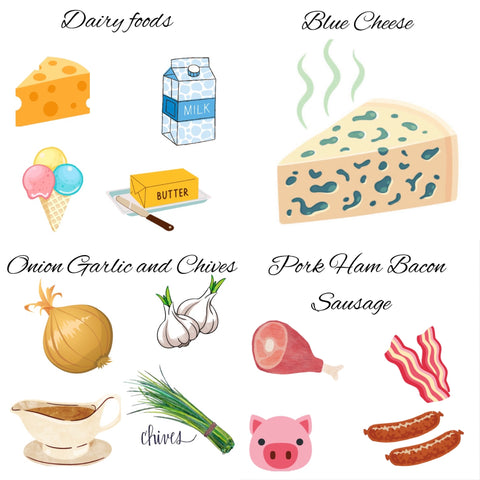
5. Dairy Food and Ice cream
Dairy foods are not recommended for dogs as they can cause diarrhoea and other digestive disturbances as well as allergic reactions. If you want to let your dog have ice cream try the specialist dog friendly brands like Marshfields Ice Cream who make tubs especially for dogs.
6. Blue Cheese
Roquefort and other blue cheeses contain a substance called roquefortine C, which is a substance produced by the fungus used to make these cheeses. Dogs are sensitive to this substance and in more extreme cases it can cause dogs to quickly develop muscle tremors and seizures which could last for up to two days.
7. Onions, garlic and chives
It can be easy to miss these ingredients, as they’re often hidden in fresh, cooked or ready prepared foods as well as festive recipes. They are commonly found in stock cubes, gravy, sausages and stuffings, all commonly found in the Christmas kitchen. If eaten by your dog they cause blood cell damage and anaemia.
8. Ham, bacon, pork and sausage meat
There are often lots of joints of meat at Christmas, so make sure no one is tempted to give scraps of pork products to your dogs. Pork meat, ham, bacon and sausage can cause pancreatitis which is a potentially life-threatening disease.
These are the most common signs, nausea, lethargy, abdominal pains, diarrhoea and a decreased appetite. Dogs sometimes take up a praying/bowing position during an attack.

9. Nutmeg
Nutmeg is a spice that is often used in festive, sweet Christmas treats like biscuits and gingerbread. Large amounts of nutmeg can be toxic, causing hallucinations, stomach pain and possibly even seizures. Generally it is best to avoid giving any baked goods to your dog as they can contain lots of things that upset doggy tummies.
10. Nuts
Nuts can cause stomach upset and other health complaints because of the extremely high fat content and other substances they may contain. In particular, macadamia nuts are incredibly dangerous, as ingesting even small amounts can cause vomiting, tremors, paralysis, rapid heartbeat and other complications in dogs. They are often included in packs of Christmas nuts so watch out for them.
11. Raisins and grapes
I think everyone know that grapes are dangerous but dried fruit is equally harmful if you dog eats any. Fruitcakes like Christmas pudding are one holiday offering likely to contain dried fruits. Even a few sultanas or raisins can cause rapid kidney failure in some dogs. Even if there is loads of Christmas pudding left, don’t think you can give the leftovers to your dog!
Be careful if your dog can reach the kitchen counters too! My sister’s dog sniffed out a foil wrapped mince pie in her handbag which was on a chair and polished it off. This resulted in a 3 day stay in intensive care at the animal hospital and a huge vet's bill at Christmas not to mention the upset and anguish that he might not survive.
12. Salt and Sugar
It’s easy to forget about the high levels of salt and sugar in our holiday foods. If a dog ingests too much of these ingredients they can suffer from excessive thirst, frequent urination or worse. This is something to be aware of if your dog has underlying kidney or heart conditions. The sugar found in lots of Christmas foods can lead to tooth decay, obesity and even diabetes. It’s also bad news for dogs with arthritis so it's nest to avoid at all costs.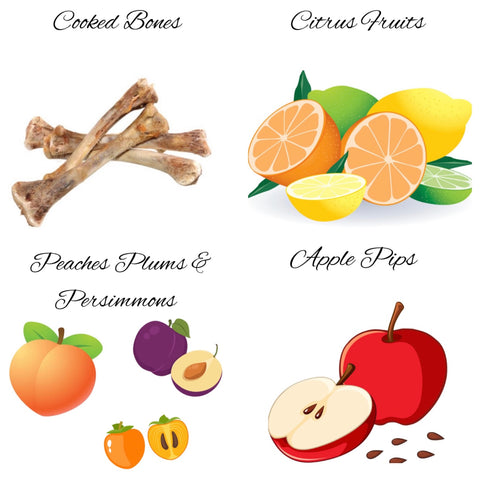
13. Turkey bones and cooked bones
If you’re visiting family or friends this Christmas, make sure they don’t give turkey or other meat bones to your dog. This is because cooked bones can splinter and perforate the intestines, requiring surgery. This can be fatal. Make sure bin lids are firmly closed and the carcass of the turkey well out of reach of doggy paws.
14. Citrus fruit
The stems and leaves of citrus plants as well as the peel, fruit and seeds contain varying amounts of citric acid. This essential oil can cause irritation and possibly even depression of the central nervous system if eaten in significant amounts. A small doses, such as eating the fruit are not likely to cause a minor stomach upset.
15. Persimmons, Peaches, and Plums
The problem with these fruits is the seeds or stones. Due to their size they can block their intestines if ingested.
Peach and plum stones also contain small doses of cyanide, which is poisonous to people and dogs.Apricot and cherry stones are dangerous too! We know not to eat them but our dogs don't.
16. Apple Pips
Apple pips contain tiny amounts of cyanide. Over time this can accumulate in your dog’s system. If you want to give them apple slices just remove the core first.
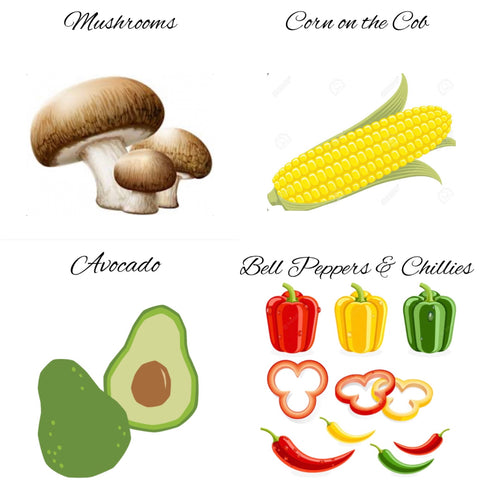
17. Mushrooms
Some mushrooms can affect your dog’s liver and some will even cause liver failure. They can become lethargic, jaundiced and weak but the symptoms may take a while to appear after the damage is done. If ingested dogs should be treated quickly to avoid long term damage
18. Corn on the cob
Sweetcorn isn’t a danger to dogs but the cob on which it grows is. If swallowed it may cause intestinal blockage requiring surgery. This could be fatal and a stressful event for you and your dog. They can be tempted to eat them as corn is often rolled in butter which most dogs love.
19. Avocados
Avocados contain persin, which can cause stomach upsets in dogs. It is in the stone, skin, flesh and leaves of the plant. The stones cannot be digested so can also cause a blockage if eaten.
20. Peppers and Spices
Bell peppers, chillies and paprika all contain capsaicin. Humans love it and can cope with it but for dogs it is an irritant which will leave their mouth burning and can lead to excessive vomiting.
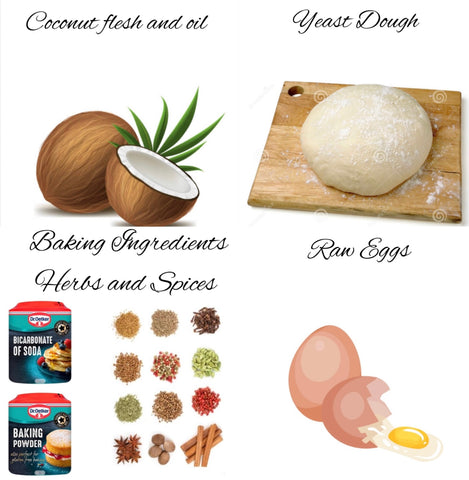
21. Coconut and Coconut Oil
If eaten in small amounts, coconut and coconut-based products are not likely to cause serious harm to your dog, but the flesh and milk of fresh coconuts do contain oils that can cause stomach upset and diarrhoea. Coconut water is high in potassium which can also be harmful.
22. Yeast Dough
The yeast in the dough produces ethanol as a by product and a dog ingesting raw bread dough can become drunk. The yeast in the raw bread dough can also cause stomach expansion, which can result in tissue damage and difficulty breathing. Yeast dough rises and creates gas in your dog’s digestive system. This will cause pain and can bloating, and potentially the stomach can twist, making it a life threatening emergency.
23. Baking ingredients
Lots of pantry items are dangerous for dogs. If eaten in large amounts baking powder or bicarbonate of soda are both highly toxic. It’s a good idea to keep these things along with herbs and spices in a high cupboard or fit a child catch to the cupboard door to keep out inquisitive noses.
24. Raw Eggs
Some people feed their dogs a "raw diet" that includes uncooked eggs. But many vets don't agree. There is an increased the chance of food poisoning from bacteria like salmonella or E Coli if your dog eats raw. It is a good idea to chat to your vet about it before starting a raw or if you have questions.
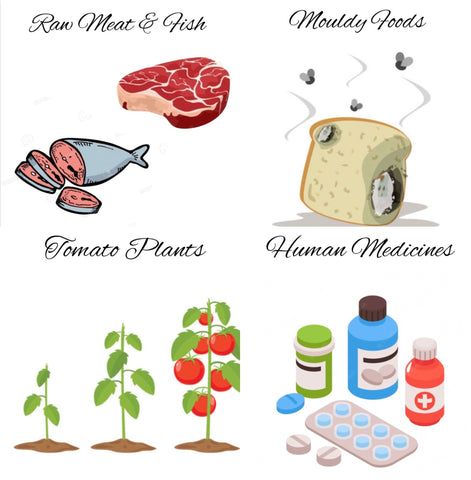
25. Raw Meat and Fish
Like raw eggs, raw meat and fish can carry bacteria that causes food poisoning. Some fish such as salmon, trout or sturgeon can also carry a parasite that causes "fish disease" or "salmon poisoning disease." It is treatable, but your dog will need to see a vet. The first signs are vomiting, fever, and enlarged lymph nodes. To ensure that the parasite is killed fish should be fully cooked before giving it to your dog.
26. Mouldy foods
Mouldy foods can contain lots of different toxins and, if eaten, may make your dog ill. One particular substance, which is mostly found on mouldy dairy products, bread and nuts, can cause dogs to quickly develop muscle tremors and seizures, which may last for up to two days.
If you compost your food scraps in the garden, make sure that they are kept outside in a sealed container that your dog cannot access.
27. Tomato Plants
Tomato plants contain glycoalkaloids which cause diarrhoea and vomiting. If they eat a lot tremors and seizures will also be a possibility. Unripe green tomatoes can be damaging too.
28. Human Medicines
If you need to treat aches and pains or cure a hangover during the festive season it’s a good idea to keep all medicines out of the reach of your dog.
The side effects can make them very sick indeed and even poison them.
Never be tempted to give your dog any over-the-counter medicine unless your vet tells you to. Some of the ingredients in common pain killers can be fatal for animals.
Leo once stole a blister pack of paracetamol from my husband’s rucksack which was zipped up on a dining chair. Somehow he got his snout into the bag and chewed up the blister pack. We had no idea how much he had ingested so there was an emergency vet trip where he was treated for paracetamol poisoning. It was very scary indeed and expensive!
What to do if you think your dog is poisoned
If you think that your dog may have eaten, touched or inhaled something that it shouldn't have,
- Speak to your vet straight away.
- Never ever try to make your dog sick.
Trying to do this can cause other complications, which may harm your dog.
Things to tell your vet
In an emergency you can help your veterinary practice make an informed decision as to whether your dog needs to be treated and, if so, what the best treatment would be. Where possible you should provide your vet with the following information:
- What poison you think your dog has been exposed to (i.e. chocolate, ibuprofen etc.). Include any product names, or lists of ingredients if relevant
- How much they may have been exposed to (i.e. 500mg, 500ml, one tablet etc, even approximations may help)
- When your dog was exposed to the poison (i.e. five minutes, five hours or five days ago)
- If your dog has been unwell and, if so, what symptoms have you seen
It is easier for a vet to care for a poisoned dog if it is treated sooner rather than later. If you are in any doubt, don't wait for your dog to become unwell before calling for advice.
What to take to your vets
If you do need to take your dog to your vet, make sure that you take along any relevant packaging, or a sample of what ever they have eaten.
e.g. parts of plant or fungi.
As with most things prevention is better than cure, so if you can make sure the whole family knows which foods are safe for dogs to eat. Hopefully this will help to keep them safe over Christmas when there are so many more dangers around.
